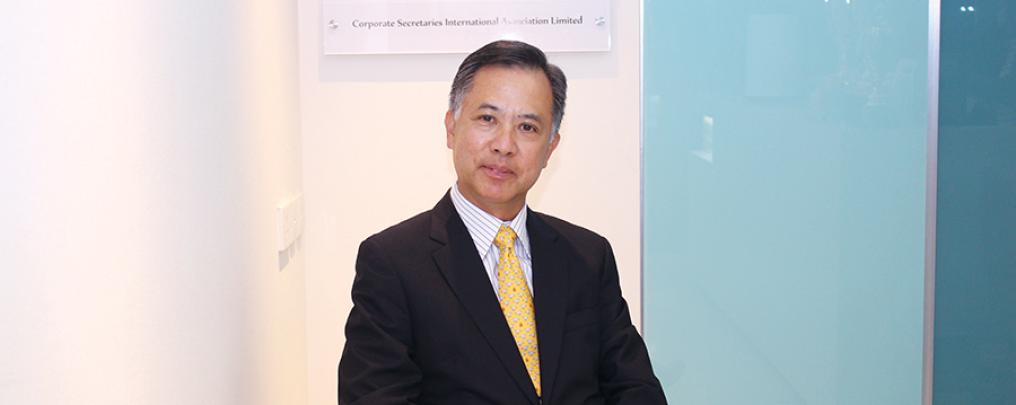CSj highlights the recommendations of the latest guidance note issued by the Institute’s Public Governance Interest Group on how to arrange your AGM while complying with the social distancing regime now in place in Hong Kong.
As the 2020 AGM season gets underway, high on the list of operational challenges resulting from the COVID-19 pandemic will be how to arrange an AGM while complying with the social distancing regime in place in Hong Kong to minimise the spread of the virus. Fortunately, a new guidance note issued by the Institute’s Public Governance Interest Group (PGIG), provides a useful summary of best practice recommendations for arranging AGMs in this context. The recommendations are primarily for non-governmental organisations (NGOs), but have relevance more widely in the market.
Complying with Hong Kong’s social distancing regime
In March this year, the government brought in the Prevention and Control of Disease (Prohibition on Group Gathering) Regulation (Cap 599G) (the Regulation). The Regulation limits group gatherings in public places to no more than four persons. The guidance note addresses the implications of the Regulation for AGM arrangements. It makes it clear that Exemption 11 to the Regulation exempts ‘group gathering at a meeting of a body that must be held within a specified period in order to comply with any Ordinance or other regulatory instrument that governs the operation of the body or its business’.
This exemption means that NGOs that are companies limited by guarantee established under the Companies Ordinance – this is the most common structure for NGOs in Hong Kong – are exempted from complying with the social distancing requirements under the Regulation in relation to their AGMs. The guidance note recommends that NGOs monitor the situation, however, since the Regulation is required to be renewed every 14 days and changes may be made. NGOs should therefore regularly check the latest wordings of the Regulation and related exemptions.
It also points out that external venue providers may be required to comply with other regulations relating to social distancing. NGOs should therefore also monitor these risks relating to their upcoming AGMs.
NGOs that are not structured as companies under the Companies Ordinance may not be covered under Exemption 11. The guidance note recommends that they need to take legal advice as to whether they are exempted from complying with the social distancing requirements of the Regulation.
Technology to the rescue?
COVID-19 has highlighted for many organisations the benefits of adopting AGM-facilitating technologies. Most relevant for organisations in Hong Kong are the technologies enabling organisations to hold their AGM in the ‘hybrid’ format – this refers to meetings combining both in-room and remote attendance.
The Institute has been at the forefront of promoting hybrid meetings for many years. This format has a number of governance advantages. First and foremost it broadens the accessibility of the AGM as it permits both those unable to make the physical meeting and also those who prefer the in-room experience to attend.
The current COVID-19 outbreak has certainly highlighted the advantages of the hybrid format since it enables shareholders to continue to attend AGMs at a time when physical meetings are severely constrained.
Currently the number of organisations using the hybrid format is relatively low in Hong Kong, but this number is expected to rise as more organisations embrace digitalisation. Holding a hybrid meeting is permitted under Section 584 of the Companies Ordinance, which states that ‘a company may hold a general meeting at two or more places using any technology that enables the members of the company who are not together at the same place to listen, speak and vote at the meeting’.
Section 584, however, only has effect subject to any provision of the company’s articles of association. The guidance note therefore reminds NGOs to check that they do not have restrictive provisions in their constitutional documents. If this is the case, organisations should consider amending their articles to allow for electronic meetings and voting for the future. Article 38 of the Model Articles for a company limited by guarantee is commonly regarded as being not restrictive of the holding of hybrid meetings under Section 584 of the Companies Ordinance (see ‘Article 38 of the Model Articles’).
The guidance note also points out that it is possible to hold an AGM by paper circulation of the resolutions under Sections 548 and 556 of the Companies Ordinance. This would, however, in most cases be impracticable for larger organisations and would also require the consent of all members in writing beforehand.
Physical meetings
Most organisations in Hong Kong, including those able to take advantage of the hybrid format, will need to arrange a physical meeting for their AGM and this will inevitably involve risks of contributing to the spread of COVID-19. The guidance note makes recommendations on ways to minimise this risk. Some of the recommendations are highlighted below.
Proxy voting
Physical attendance at the AGM is not necessary for shareholders to exercise their voting rights. The guidance note points out that organisations can appoint the chair, or other eligible person, as proxy to vote in accordance with their instructions. Shareholders should be encouraged to do so, albeit this should not be the case under normal circumstances.
Delaying the meeting
An NGO that is limited by guarantee under the Companies Ordinance can hold its AGM up to nine months from the end of its financial year. The guidance note recommends that organisations take advantage of this while monitoring further developments to better plan their AGM.
Choosing a venue
The guidance note recommends choosing a venue that will enable you to expand the seating arrangements for social distancing purposes. Also, organisations may want to select a venue that allows them to house attendees in different rooms. This would, however, require them to make the appropriate audio and visual arrangements.
Other measures
- The guidance note recommends considering requesting shareholders to preregister their proposed attendance at the AGM.
- Electronic voting as a means of voting at a physical AGM should be considered with a view to reducing physical interactions during the voting process.
- Where electronic voting is not possible, organisations may consider encouraging members to place their voting forms in prearranged voting boxes to reduce physical interactions when collecting them.
- The AGM circular should make it clear that attendees will need to be screened for body temperature and those with a high temperature or other signs of a COVID-19 infection will not be admitted to the meeting.
- The AGM circular can also provide a health declaration form which members will need to submit at the AGM.
- Organisations may also want to make it clear that there will not be any refreshments or souvenirs at the meeting and that attendees will need to wear masks at all times.
- Alcohol rubs and/or hand sanitisers should be provided at the venue.
- Microphones should be disinfected after each use.
Fulfilling the purpose of the AGM
Two months since COVID-19 was declared a global pandemic by the World Health Organization, there still seems to be no end in sight of the major operational challenges facing organisations trying to adapt to the exceptional conditions resulting from the pandemic. In this context, this year’s AGM season brings unprecedented challenges to organisations in Hong Kong and around the world. The latest PGIG guidance note will be a useful resource for organisations seeking to ensure that this year’s AGM serves its purpose of permitting shareholders to participate in the governance of the organisation, without contravening the social distancing regime in place in Hong Kong to minimise the spread of COVID-19.
The guidance note reviewed in this article is the sixth in the series of guidance notes issued by the Institute’s Public Governance Interest Group. It is available, along with all of the guidance notes issued by the Institute’s seven Interest Groups set up under the Technical Consultation Panel in June 2016, from the Publications section of the Institute’s website: www.hkics.org.hk.
SIDEBAR: Article 38 of the Model Articles – attendance and speaking at general meetings
- A person is able to exercise the right to speak at a general meeting when the person is in a position to communicate to all those attending the meeting, during the meeting, any information or opinions that the person has on the business of the meeting.
- A person is able to exercise the right to vote at a general meeting when: a) the person is able to vote, during the meeting, on resolutions put to the vote at the meeting, and b) the person’s vote can be taken into account in determining whether or not those resolutions are passed at the same time as the votes of all the other persons attending the meeting.
- The directors may make whatever arrangements they consider appropriate to enable those attending a general meeting to exercise their rights to speak and/or vote at it.
- In determining attendance at a general meeting, it is immaterial whether any two or more members attending it are in the same place as each other.
- Two or more persons who are not in the same place as each other attend a general meeting if their circumstances are such that if they have rights to speak and vote at the meeting, and they are able to exercise them.



